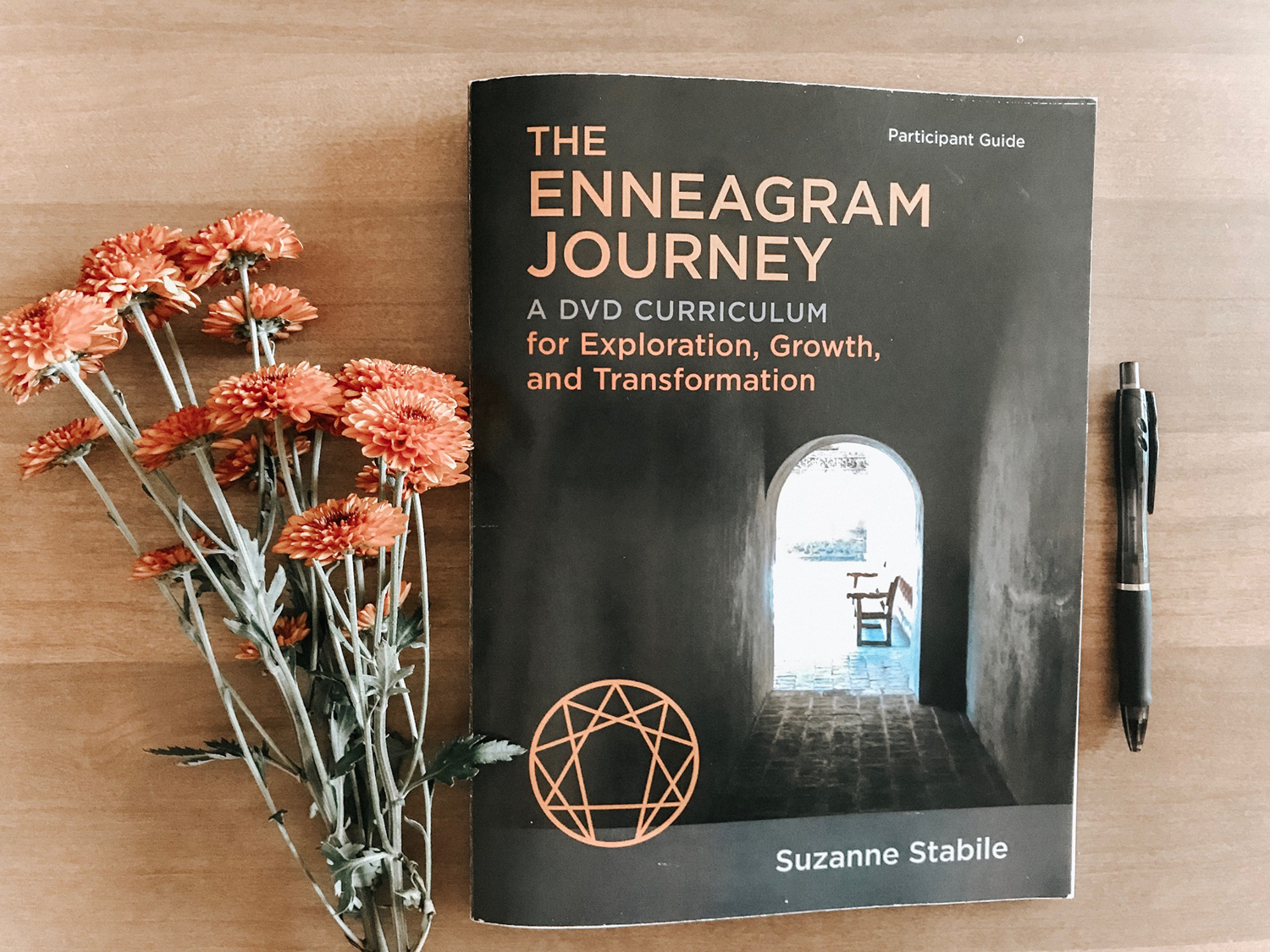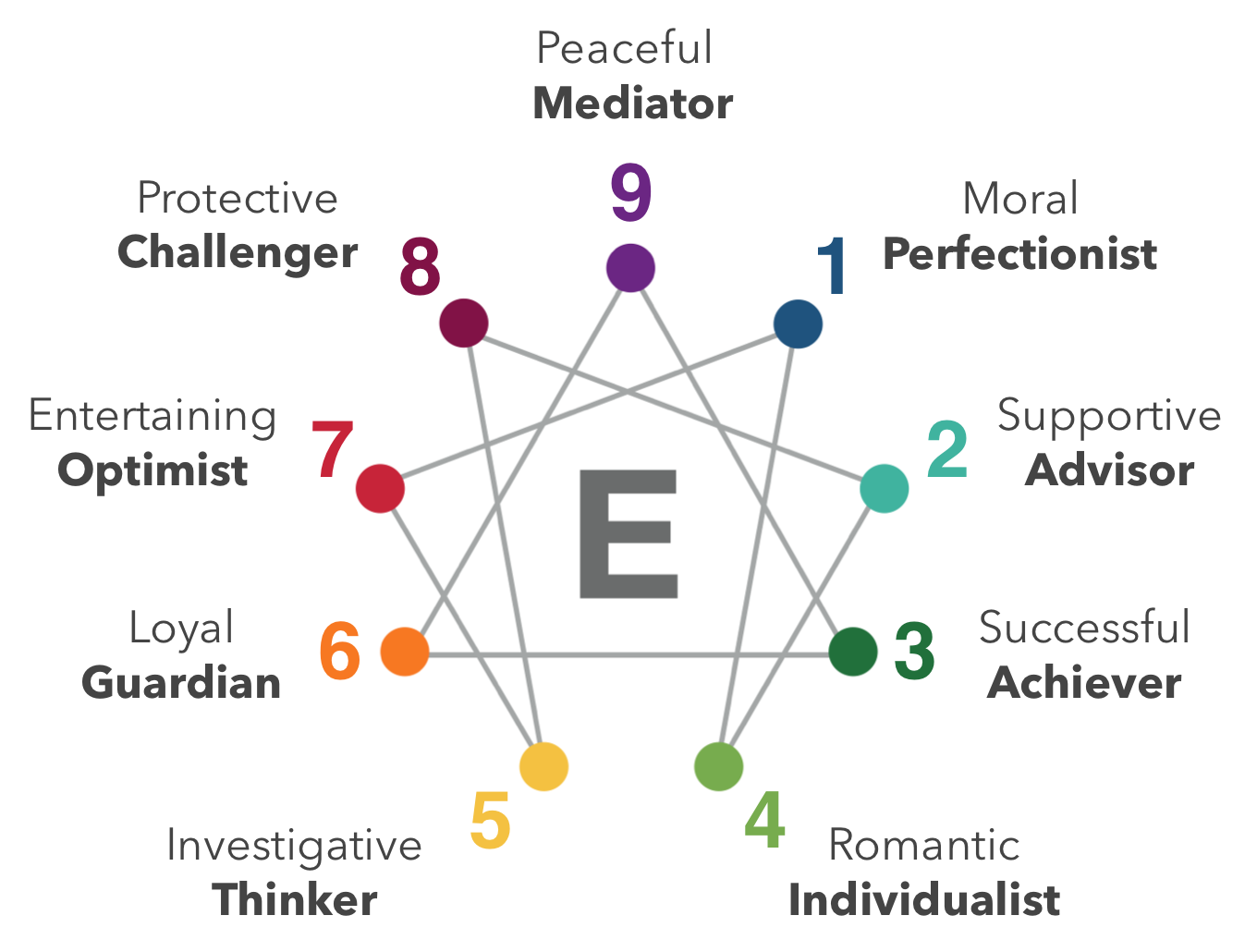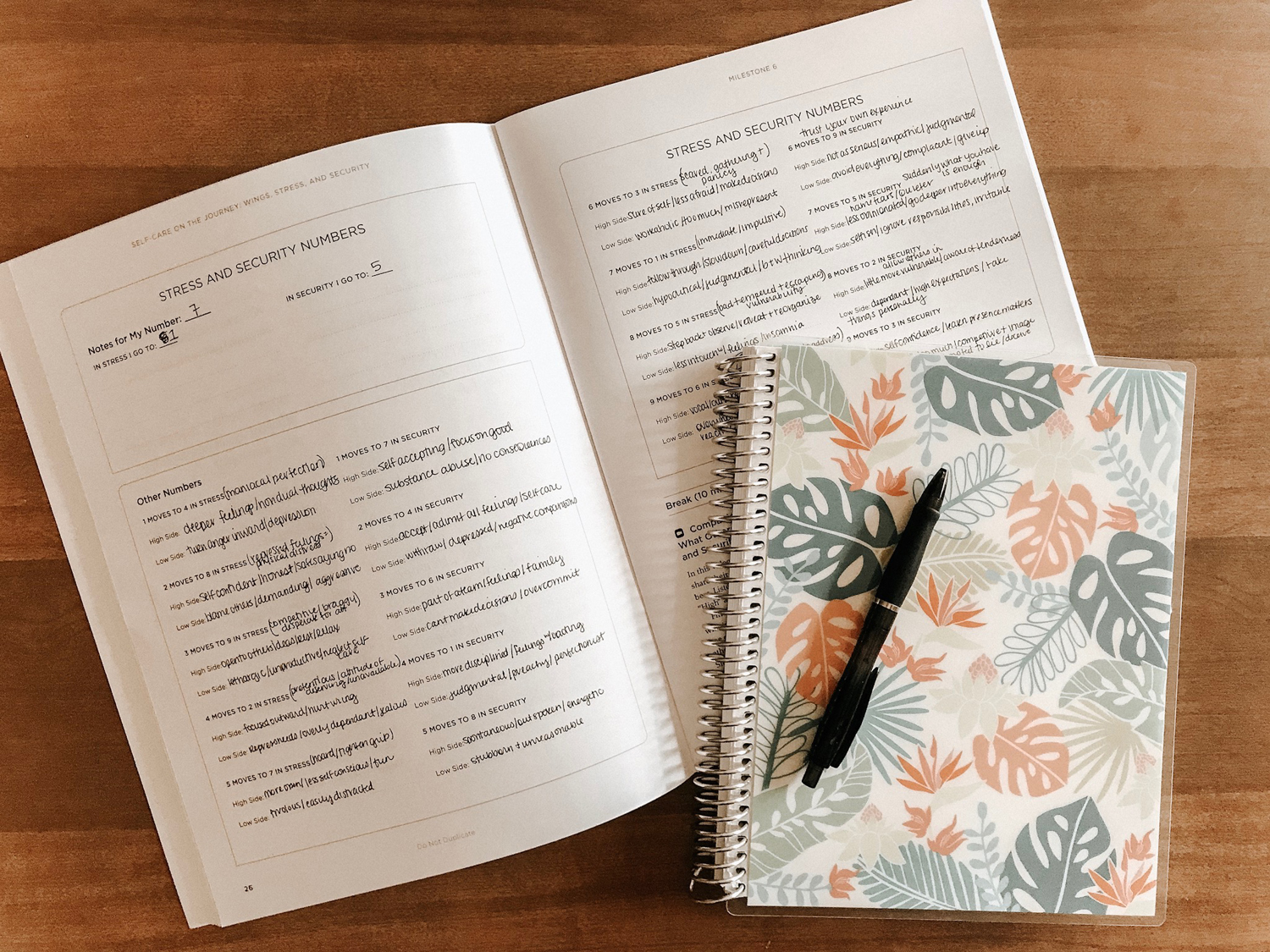If you’ve been around for a hot second, especially over on Instagram, then you’ve heard me blabbering on a lot about the Enneagram! It is truly a lot to take in and process, something that could never be covered in one singular blog post, but I did want to share three things with you about the Enneagram that I’ve learned!

Three Things About the Enneagram
First, a very short crash course in the Enneagram! The Enneagram (pronounced “eny-a-gram” and from the Greek ennea, for “nine”) is an ancient personality typing system that identifies nine different personality types. The symbolic representation of the Enneagram is a circle with nine numbered points around the circumference. Each number is connected to two other numbers by arrows.
The personality of each number on the Enneagram is determined by their motivations, not their behavior, and includes a basic passion (some call it a sin) and desire. For example, my basic passion or sin as a seven on the Enneagram is gluttony, and my desire is happiness.
The objective of Enneagram work is self-observation and self-observance to understand and mature beyond the limits of your personality. It can also be used for understanding others better, building a team that works well together, and spiritual growth.

image via Your Enneagram Coach
1. Don’t Take an Enneagram Test!
This is something we were told on the first day of our class during the Enneagram journey, and at first I thought it was silly. I had taken the test a while back – a free one, actually – and it told me my number was seven. While it wasn’t wrong for me, in the course of my discussions on this subject, I’ve discovered a number of people who took an online assessment, where told they were one number or another, and then either read the Road Back to You or started studying further into the Enneagram and discovered that the test was wrong and that they were another number altogether! I’m not saying that the test will undoubtedly be wrong, but what I do want to reiterate here is this:
The Enneagram is about your motivations, not your behavior. So when you take an assessment online, and it says “what would you do in this situation:”, you truthfully say what you would do. But the real driver that you’re trying to find out here is “what would you do in this situation, and why?”
For example: You’re at your current job and there is an opening available that would mean you would receive a promotion and a pay raise. Why would you want to apply for this position?
A seven (me!) wants to apply for the position because of the promise of something new and exciting to experience.
A three (the acheiver) wants to be seen as someone who can succeed at anything they put their mind to, so of course everyone needs to see them apply for this position and get it.
A six (the loyalist) loves working for the company and feel it is their duty to show their loyalty by applying for this position.
An eight (the challenger), is excited about the intensity and rush that comes with taking on a new position.
Do you see what I am getting at here? Of course everyone would apply for the new position, but the motivation behind it is completely different for each person. And a lot of the time, you can’t really know your own motivations without doing some serious self observation… which brings me to my second point.
2. Non-judgmental self observation is a huge mountain to climb.
Suzanne Stabile, the author of The Enneagram Journey speaks in depth about the importance of learning to observe yourself in every situation that you’re in. We spend a lot of time just reacting to things, going through our daily lives, interacting with people, and judging ourselves without ever really stopping to observe what we have done, said, or thought, and why. Taking the time (and booooyyyy does it ever take training and time) to stop and think in every situation (or even a fraction of the situations in which we find ourselves) “what did I just do?” and “why did I do that?” is where you’re going to find out what your real motivations are.
“Tune in to how you’re different from everyone else.” – Suzanne Stabile
I started carrying a pen and a small piece of paper in my purse and any time I had a reaction to something or someone that caught my attention, I quickly stopped and wrote down why I thought I might have reacted that way. Say you’re driving to work and someone cuts you off and you yell at them. I mean – anyone would react that way so the reaction itself is not out of the ordinary – but stop to think about WHY you yelled. Was it because you were afraid you would be late to work and upset your boss? Was it because they were breaking the rules and people should be yelled at for breaking rules? Was it because they were delaying you from starting a fun project at work? Or was it just because it caused you to slam on your brakes, which might have inconvenienced the people behind you? You have to take note of why you react the way you to in situations, not just what the reaction is.
“When you’re not being honest with yourself about you, you’re not fooling anyone but yourself.” – Suzanne Stabile
The last piece of this new practice is to be non-judgmental. For some numbers this will not be an issue at all, but for others, like ones on the Enneagram who are constantly mentally criticizing everything, including themselves, this will be an intense journey. Let me give you an example. My son Jett was taking his sweet time getting ready for school one morning – on a day that I was supposed to be going to meet a new friend for coffee. I got frustrated with him and yelled at him to hurry up! Raise your hand mamas if you’ve ever yelled at your kids to hurry up. See? I knew I wouldn’t be alone in this!
- Judgmental self observation: UGH! I yelled at Jett because he is going to make me late to meet this new and interesting person! I’m such a terrible selfish mom – I should just take him to get a doughnut as an apology.
- Non-judgmental self observation: UGH! I yelled at Jett because he is going to make me late to meet this new and interesting person! That’s interesting. FULL STOP.
I think, most especially as women, that we are so immediate to judge ourselves for our action that not only do we quit focusing on the motivation behind why we do things, we forget about it altogether! Non-judgmental self observation is likely not something you’re thinking about when you’ve just randomly decided to take an online personality test. So if you’ve taken it, and its spit a number back at you, I would recommend holding space for that number and then reading The Road Back To You by Suzanne Stabile and Ian Cron and see if it still holds true once you’ve read that book.

3. The Enneagram is not a “get it and forget it” type of personality system.
Most personality assessments I’ve taken, or heard of, like the Myers-Briggs or the DISC give you your results and that is basically the end of it. The main reason I love the Enneagram as much as I do is because once you find out your type, or number, that is where the journey actually begins! And as a seven, I love an exciting journey that will take me places I’ve never been before!
“Nothing that has to do with transformation is linear. It is circuitous: you’ll never arrive anywhere. It is all a journey” – Suzanne Stabile
The Enneagram is truly a journey – a foray into yourself and learning about how you view, exist in, and take in the world. It doesn’t just stop with getting to know you as your personality; it is using the work in the Enneagram to get back to your true essence, who God has created you to be. This does not mean that your personality can change over time (once you’ve figured out your number, that is your number for life) but it does create space for more balance to come in as you learn more about yourself and how you view and react to the world. You learn to rely on parts of yourself that you have buried deep within (for me, it is feelings) or if nothing else, to create space for those buried parts to come forth and see the light more often (or, for once!).
Do not go into studying the Enneagram thinking that you can do a weekend retreat on it or heck, even Suzanne’s 12-week course, and get everything out of it that you’ll ever need. I believe that for those who are looking for true transformation, it will be a lifelong journey that will walk hand in hand with a spiritual journey. Learning to know myself, and to create space in myself and my life for God to come in and do some work on me to bring me more in balance with who He created me to be is my goal with Enneagram work. That will take a lifetime! But it is truly the best and most effective way I’ve found in my life so far to seek God in my life and look for places in myself that need improvement. Its been that bridge that I feel like I’ve been missing.
Did you just scroll to the bottom? I feel you – here’s a recap:
- Don’t take an online Enneagram test. The enneagram is about your motivations, not your behaviors, because we may all do the same thing, but the motivation behind them all is different.
- Learn to non-judgmentally observe yourself. Stop when you have a reaction and think to yourself “why did I behave or react in that way” without following it with a judgmental statement about the reaction. This will start to lead you to your true motivations.
- The Enneagram is a lifelong journey that starts when you find out your type, or number. Don’t expect it to be something you can fully take in over a weekend retreat or 12-week study.
So there you have it – three important things I learned about the Enneagram! Are you intrigued? Do you think you’ll read the book? I seriously think that if everyone on the planet took part in their own journey, that we could come close to some form of world peace. That’s saying something. As always, let me know if you have questions below!

Love this post, Skye! Already failed and took a test online (oops!) but this post has made me realize that I need to do some more research and digging into my personality type. Going to grab this book. Thanks!